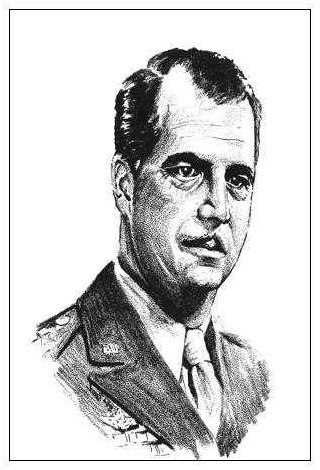(Article contributed by: Richard Clark, Kernersville, NC)
(Images provided by S/Sgt Gilbert Fisceri (Ret) (Assigned to WAFB 1961 to
1965) )
 |
Major General Paul B. Wurtsmith
|
Morale and fighting spirit seem to have been Paul Wurtsmith's motto. Wherever and whenever he led men --- whether in battle or in maneuver --- these
words seem to have been implicit in his actions. As he went from one command to
another, his reliance on those words seemed to increase.
As a young Captain in the Army Air corps, he led a group of even younger
pilots from Selfridge Field, Michigan, up the peninsula to an outpost known as
Camp Skeel, now Wurtsmith Air Force Base. It was December 1940 when 13 P-35's
and one B-10 landed on the blacktop runways. Their mission was to find out how
to fly under near-arctic, sub-zero conditions.
The 21 pilots and 100 enlisted men weren't exactly comfortable that winter,
but they managed quite well. They had to light fires of jack pine to keep their
oil from congealing and they had to pull their fuel on sleds over the
ice-covered surface of Van Ettan Lake. Their routine was grueling, often
tedious, and always rigorous.
Three years later and thousands of miles from Van Ettan Lake, the young
captain had become Brig. Gen. Paul B. Wurtsmith. The record of the outfit he led
explains, to a large extent, this rapid promotion. The 49th Fighter Group shot
down 38 enemy bombers, 40 enemy fighters, with a loss of only 17 planes and 12
pilots. They defended Darwin, Australia in April 1942, against a merciless
Japanese bombardment. For this effort, the General won the Distinguished Service
Medal and the 49th earned a Presidential Unit citation
In 1945, General Wurtsmith assumed command of the 13th "Jungle"
Air Force. The 13th had a good combat record, but it needed to develop
long-range fighter and bombardment tactics. Wurtsmith helped the 13th to do this
and within a short time the unit was striking in such distant lands as Batavia,
Java, and French Indo-Chine with night-flying bombers. All the while, it
maintained a tight aerial blockade of the South China Sea, cutting off Japan's
vital flow of raw materials from the lands she had conquered to the South.
 |
Constitution Park, Wurtsmith Air Force Base, Michigan
|
Once the war was over, the 39-year-old Major General assumed his last big
command. He took over the advanced headquarters of the Far Eastern Air Forces,
which included the Fifth Air Force in Japan and Korea and the Seventh Air Force
in the Ryukyu's, along with his post as commanding general of the 13th, which
settled in the Philippines.
After all the combat flying overseas, after the bombardment of Rabaul, the
interception of the Japanese attack of Darwin -- no one could have anticipated
tragedy for General Wurtsmith. It was just a routine flight to McDill Field,
Tampa, Florida, after a visit with his mother to help her celebrate here 77th
birthday
The news flash came: "After a brilliant war record in the air, Major
General Paul B. Wurtsmith, 40, of Detroit, crashed to his death in a high North
Carolina mountain top (Cold Mountain) while on a routine flight." He was
buried in Arlington National Cemetery in September 1946.
He had lived a lot of lives in 40 short years. He had been a pioneer, and
experimenter, a soldier and a leader, to mention just a few. He had seen enough
war in his time to recognize the creeping horror of national complacency. Like
the true modern soldier, he had led his men into battle -- and led them
magnificently -- hoping all the while that none of them would have to do it
again.